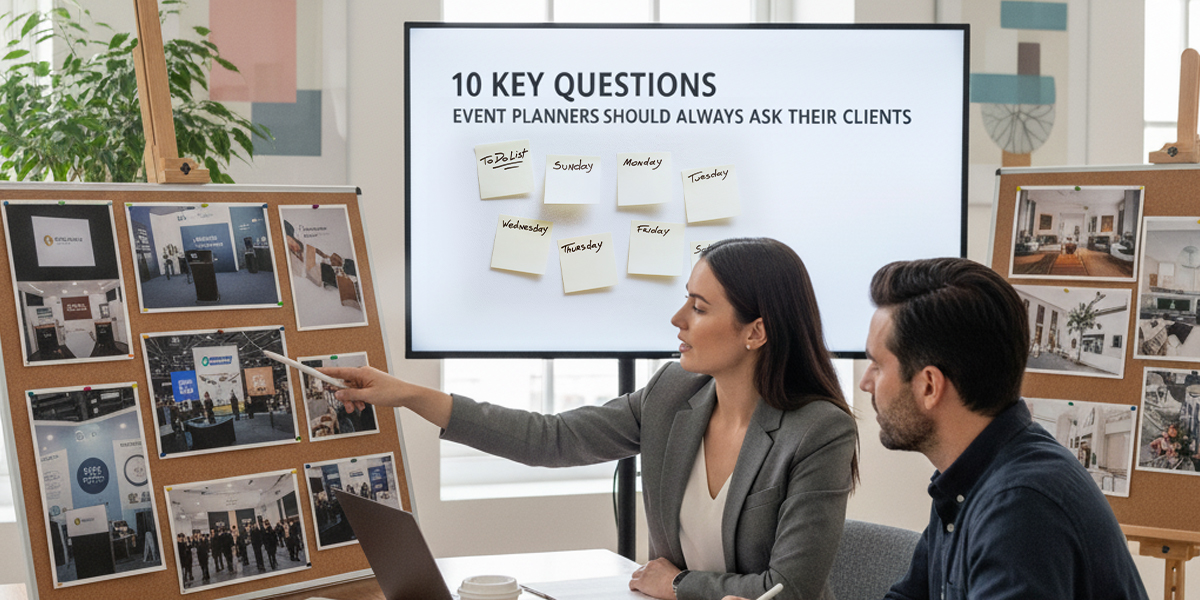Published On 22-10-2025

Every successful event begins long before the stage is set or the audience walks in. The groundwork lies in understanding what your client truly envisions. Whether the goal is a large-scale product launch, an intimate leadership gathering, or an engaging town hall, asking the right questions at the very beginning ensures clarity, minimizes unexpected hurdles, and creates memorable experiences.
At 24 Frames Digital, we believe that the difference between a good event and a great one comes down to how well expectations are aligned. Here are the top 10 questions that every planner should ask before diving into event planning.
Is the event focused on driving employee engagement, showcasing innovation to clients, or celebrating a business milestone? Understanding the central purpose gives direction to the creative design, the content flow, and even the choice of format. This clarity helps decide whether the event works best as a live on-ground celebration or as a carefully designed virtual & hybrid event.
The needs of a leadership team are very different from those of a larger employee base. The setup for senior executives in leadership events may require a more intimate setting with thoughtful networking opportunities, while town hall meetings demand high-energy presentations and interactive moments. Knowing who the event is truly meant for helps build an experience that feels relevant and impactful.
Budgets are not just numbers. They set the foundation for what can be achieved. A transparent discussion around budgets allows corporate event management teams to recommend realistic solutions, ensuring that the ideas presented can actually be executed. When clients share an open budget framework, it also empowers planners to offer creative solutions within that range without the risk of overshooting.
Some gatherings thrive in a physical environment where networking and energy matter the most, while others are more effective when delivered online to a global audience. With the advancement of event management platforms and professional webcasting services, clients now have the option of combining both.
The number of expected attendees directly impacts every major decision, from the size of the venue and seating arrangements to catering requirements and technical setups. For virtual & hybrid events, it also determines platform capacity, bandwidth needs, and the scale of engagement tools to be used. Clarifying guest count early helps avoid resource gaps and ensures that both the physical and digital experiences run seamlessly.
Timelines act as basic guidelines for corporate event planning. Content preparation, design approvals, creative production, technical testing, and guest communication all depend on well-defined schedules. Early clarity on deadlines ensures that no step is rushed and that every aspect receives the attention it deserves.
Every brand has its own identity and voice. Following the right visual language, fonts, and tone ensures that the event does not just engage but also strengthens brand recall. Asking this question ensures that the team aligns with the company’s culture and avoids inconsistencies that may dilute the impact of the event.
Making the event interactive and lively is always pursued by the hosts. Choosing the right form of tool for engagement plays a vital role in the success of the event. For virtual & hybrid events, engagement tools such as digital breakout rooms, quizzes, and chat walls are even more crucial to maintain energy and connection throughout.
Strong execution depends on reliable systems. For virtual & hybrid events, this means stable platforms, AV support, and troubleshooting on standby. Clear contingency planning ensures the event continues smoothly even if unexpected issues arise.
Decision-making is smoother when it is clear who needs to be updated at each stage. Sometimes, it is a single point of contact, while in other cases, there might be multiple stakeholders, such as marketing heads, HR teams, or senior leadership. Establishing a clear communication structure avoids delays in approvals and ensures that the event moves forward without confusion or repeated back-and-forth.
These questions are not just a checklist, they form the foundation of a strong client–planner relationship. When clients know their concerns are understood, they gain confidence that the event will reflect their vision.
In today’s fast-paced environment, where virtual & hybrid events are as important as large- scale physical gatherings, the role of corporate event management has shifted from execution to partnership.
Copyright © 24 Frames Digital